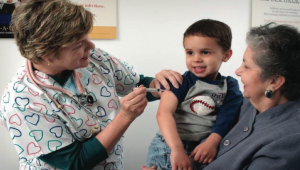Ryan Quinlan ’14
Although vaccines have provided extremely successfully in decreasing the amounts of vaccine-preventable diseases, the safety of vaccinations for children has been a topic of debate throughout the scientific and medical communities.
According to the Center for Disease Control and Prevention “Vaccine-preventable disease levels are at or near record lows.” Measels, for example, have been almost completely eliminated from the population. From 1956 to 1960, about 313 people out of every 100,000 were affected by measles. However, after two attempts to eradicate measles through vaccinations, only 1.3 cases per 100,000 people were reported in the years of 1982 to 1988.

However, despite the success vaccinations have had in reducing diseases, some studies claim that there is a correlation between vaccinations and disorders such as autism. In one of the most famous studies published in a 1998 issue of The Lancet, a highly respected British medical journal, Dr. Andrew Wakefield stated that his research showed “the MMR vaccine, a shot to combat measles, mumps, and rubella, caused autism spectrum disorders.”
After the findings were published, Brian Deer, a Sunday Times (UK) writer who focused on medical issues, found that Wakefield had broken multiple ethical codes, manipulated evidence, and had undisclosed conflicts of interest. As a result, The Lancet partially and then fully retracted the paper and the General Medical Council found him guilty of professional misconduct.
Despite The Lancet’s retraction of Wakefield’s study, the debate regarding vaccinations’ roles in causing autism persists. For example, the charity group AustismOne asserts that autism is caused by toxins in the vaccines and cites the rising quantity of vaccines for children with the increased amount of autism cases in America. Political leaders Robert and John Kennedy also supported the belief that autism and use of vaccines are directly related.
Debate regarding the safety of vaccines has existed since the first smallpox vaccine in the 1770s. Although scientists assert that they have found no link between vaccines and autism, many believe that this does not mean that there is no connection between the two.